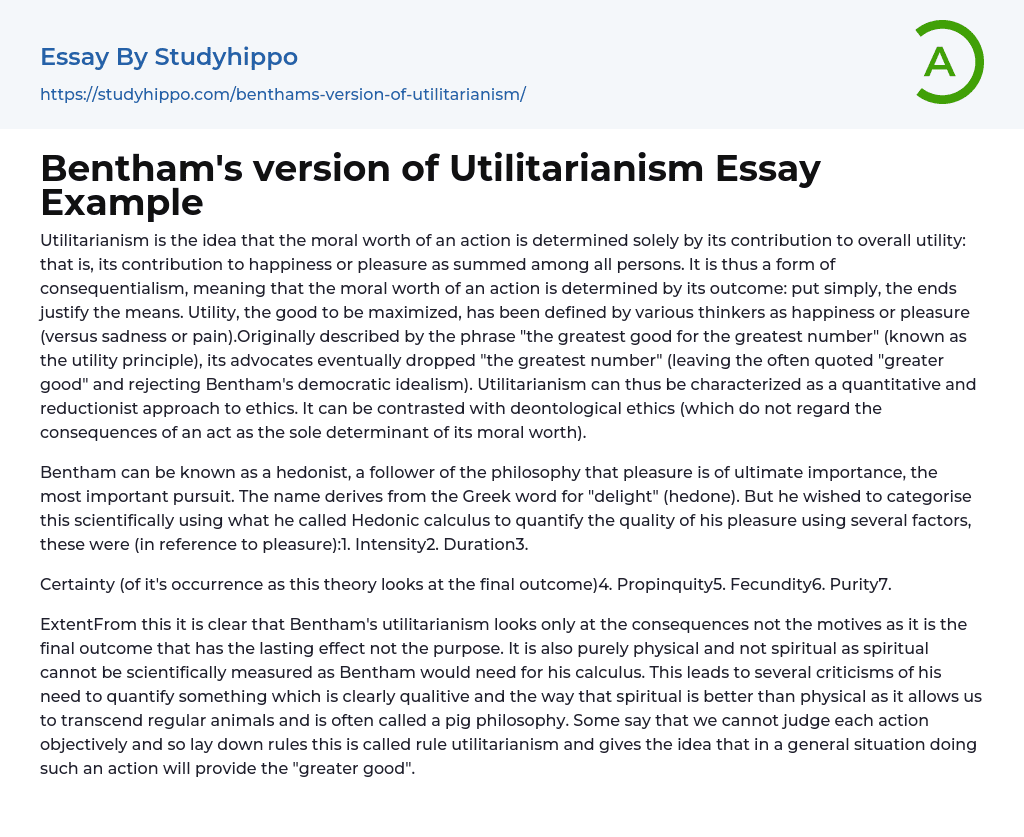Utilitarianism is the idea that the moral worth of an action is determined solely by its contribution to overall utility: that is, its contribution to happiness or pleasure as summed among all persons. It is thus a form of consequentialism, meaning that the moral worth of an action is determined by its outcome: put simply, the ends justify the means. Utility, the good to be maximized, has been defined by various thinkers as happiness or pleasure (versus sadness or pain).Originally described by the phrase "the greatest good for the greatest number" (known as the utility principle), its advocates eventually dropped "the greatest number" (leaving the often quoted "greater good" and rejecting Bentham's democratic idealism). Utilitarianism can thus be characterized as a quantitative and reductionist approach to ethics. It can be contrasted with deontological ethics (which do not regard
...the consequences of an act as the sole determinant of its moral worth).
Bentham can be known as a hedonist, a follower of the philosophy that pleasure is of ultimate importance, the most important pursuit. The name derives from the Greek word for "delight" (hedone). But he wished to categorise this scientifically using what he called Hedonic calculus to quantify the quality of his pleasure using several factors, these were (in reference to pleasure):1. Intensity2. Duration3.
Certainty (of it's occurrence as this theory looks at the final outcome)4. Propinquity5. Fecundity6. Purity7.
ExtentFrom this it is clear that Bentham's utilitarianism looks only at the consequences not the motives as it is the final outcome that has the lasting effect not the purpose. It is also purely physical and not spiritual as spiritual cannot be scientifically measured as Bentham would
need for his calculus. This leads to several criticisms of his need to quantify something which is clearly qualitive and the way that spiritual is better than physical as it allows us to transcend regular animals and is often called a pig philosophy. Some say that we cannot judge each action objectively and so lay down rules this is called rule utilitarianism and gives the idea that in a general situation doing such an action will provide the "greater good".
- Values of Life essays
- Ethical dilemma essays
- Normative Ethics essays
- Virtue Ethics essays
- Belief essays
- Deontology essays
- Moral essays
- Virtue essays
- Work Ethic essays
- Acceptance essays
- Age Of Enlightenment essays
- Child Observation essays
- Confucianism essays
- Conscience essays
- Critical Reflection essays
- Destiny essays
- Determinism essays
- Empiricism essays
- Environmentalism essays
- Epistemology essays
- Ethics essays
- Ethos essays
- Existence essays
- Existentialism essays
- Fate essays
- Free Will essays
- Functionalism essays
- Future essays
- Good And Evil essays
- Human Nature essays
- Individualism essays
- Meaning Of Life essays
- Metaphysics essays
- Natural Law essays
- Personal Philosophy essays
- Philosophers essays
- Philosophy Of Life essays
- Political Philosophy essays
- Pragmatism essays
- Reality essays
- Relativism essays
- Teaching Philosophy essays
- Time essays
- Transcendentalism essays
- Truth essays
- Utilitarianism essays




